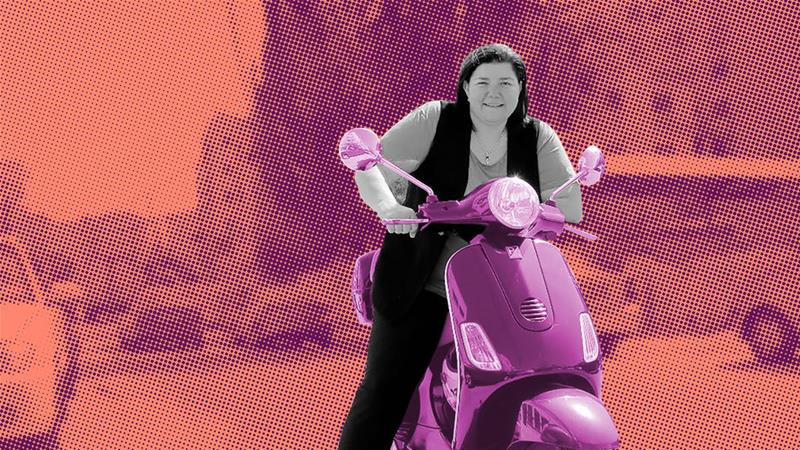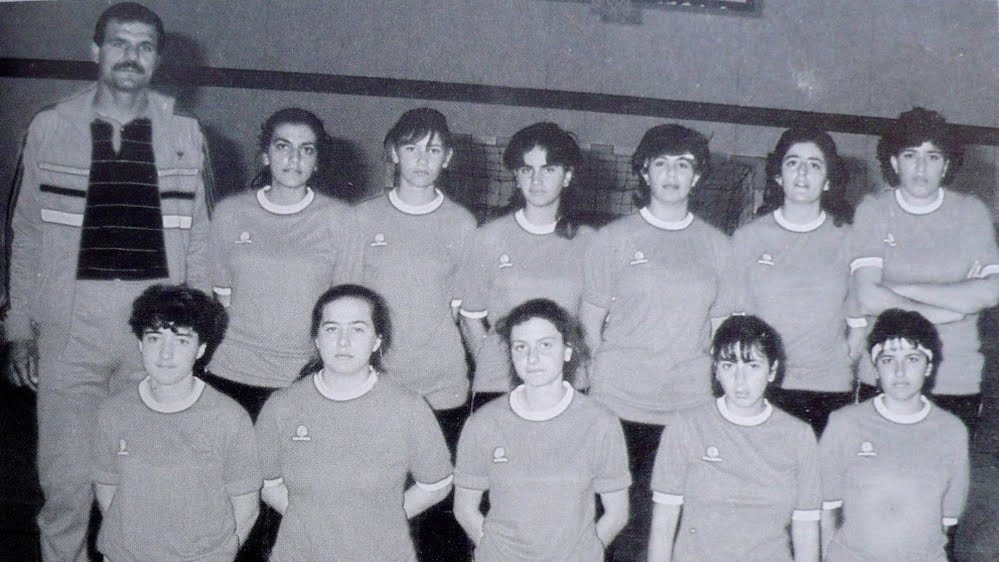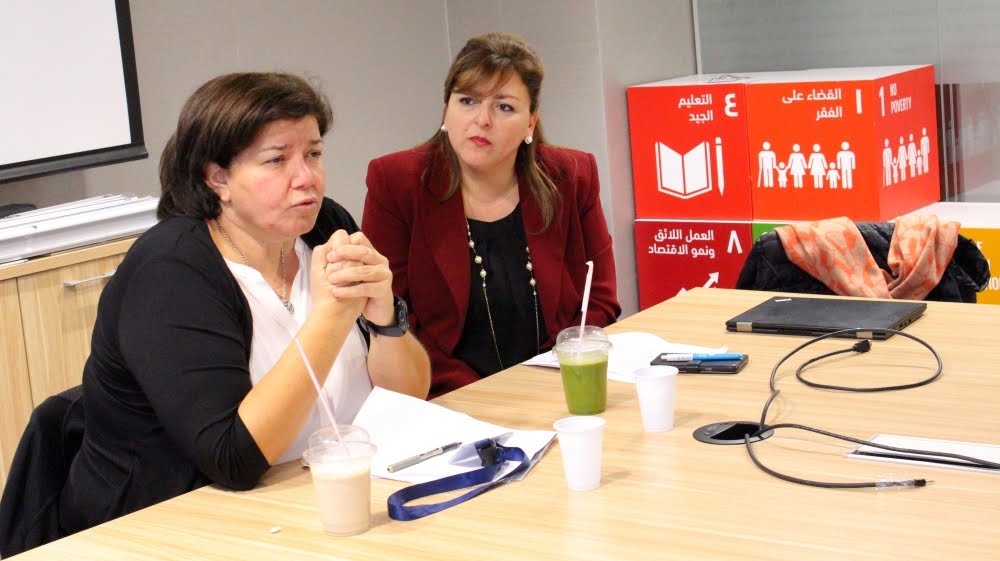🌐 WOMEN’S STORIES _ Rana Husseini
Alasdair
Soussi, Al Jazeera, may 25, 2018
The
veteran reporter battling “honour killings”. Journalist working to end violence
against women on why she has hope, having spent decades supporting gender
equality.
veteran reporter battling “honour killings”. Journalist working to end violence
against women on why she has hope, having spent decades supporting gender
equality.
 |
|
Rana
Husseini and her scooter are a common sight on the streets of Amman. |
It is,
for the 50-year-old human rights campaigner, the smartest way to negotiate the
heaving traffic in Jordan’s capital.
“In
the summer, I use the scooter most of the time, but now the traffic is very,
very bad,” she says. “The scooter is best at beating the jams,
parking and for the environment. It’s crazy here – the traffic is becoming
really crazy.”
the summer, I use the scooter most of the time, but now the traffic is very,
very bad,” she says. “The scooter is best at beating the jams,
parking and for the environment. It’s crazy here – the traffic is becoming
really crazy.”
Husseini
has no time for roadblocks – either in her commute or her life.
has no time for roadblocks – either in her commute or her life.
When she
was assigned the crime beat at The Jordan Times 25 years ago, the sport
enthusiast soon found herself covering a national taboo.
was assigned the crime beat at The Jordan Times 25 years ago, the sport
enthusiast soon found herself covering a national taboo.
So-called
honour killings – the murder of a relative who is seen to have brought shame on
the family name – were then deemed too controversial for public discourse. But
armed with her pen, a natural-born curiosity and determination to shed light on
this criminal act, Husseini soon took up a cause.
honour killings – the murder of a relative who is seen to have brought shame on
the family name – were then deemed too controversial for public discourse. But
armed with her pen, a natural-born curiosity and determination to shed light on
this criminal act, Husseini soon took up a cause.
 |
|
An
archive image of Husseini from her school days at Amman’s National Orthodox
School in 1984. She is pictured on the top row at the far right [Courtesy: Rana
Husseini] |
As she
began to expose these killings and took the lead in citizen awareness drives,
Husseini met public hostility and a judicial system that too often handed down
lenient sentences to perpetrators. Yet, with her finger firmly on the pulse of
public and governmental shifts in attitude, Husseini is optimistic.
“A
lot of things have changed since I started,” she says. “There are
more people who are against [so-called honour crimes] – and I can see this from
when I go and lecture in Jordan and from seeing people’s reactions on social
media.”
lot of things have changed since I started,” she says. “There are
more people who are against [so-called honour crimes] – and I can see this from
when I go and lecture in Jordan and from seeing people’s reactions on social
media.”
Husseini
also hails the work of the Jordanian justice system, which “is now very thorough
when it investigates cases of domestic violence and violence against
children,” and “now gives higher sentences for perpetrators of
[honour] crimes”.
also hails the work of the Jordanian justice system, which “is now very thorough
when it investigates cases of domestic violence and violence against
children,” and “now gives higher sentences for perpetrators of
[honour] crimes”.
Husseini’s
ability to break barriers and challenge traditions became apparent when she won
a place at Oklahoma City University in the US. She studied for six years,
worked as a waitress and a security guard at her dorm. She cut her teeth as a
journalist on the student newspaper.
ability to break barriers and challenge traditions became apparent when she won
a place at Oklahoma City University in the US. She studied for six years,
worked as a waitress and a security guard at her dorm. She cut her teeth as a
journalist on the student newspaper.
The roots
of her drive and success can be traced to her time at the university.
of her drive and success can be traced to her time at the university.
She
supported herself through her studies and when she returned to her homeland,
she felt drawn towards women’s
rights.
supported herself through her studies and when she returned to her homeland,
she felt drawn towards women’s
rights.
Husseini’s
part autobiography, part expose book – Murder in the Name of Honour – was
published in 2009.
part autobiography, part expose book – Murder in the Name of Honour – was
published in 2009.
She has
become a well-known face across Jordan,
accumulating well-placed sources that enable her to report and keep up to date
with Jordan’s criminal underworld.
become a well-known face across Jordan,
accumulating well-placed sources that enable her to report and keep up to date
with Jordan’s criminal underworld.
The
suspicion and outright hostility that she faced at the beginning of her career
have largely been replaced by respect.
suspicion and outright hostility that she faced at the beginning of her career
have largely been replaced by respect.
Championing
women in sport
women in sport
A former
Jordanian women’s national basketball captain, she has also championed gender
equality in sport. When Prince Ali bin Hussein of Jordan asked her to head the
Jordanian Football Association Women’s Football Committee in 2009, she jumped
at the chance “to do something for women in my country”.
Jordanian women’s national basketball captain, she has also championed gender
equality in sport. When Prince Ali bin Hussein of Jordan asked her to head the
Jordanian Football Association Women’s Football Committee in 2009, she jumped
at the chance “to do something for women in my country”.
She hopes
that the team will qualify for next summer’s FIFA Women’s World Cup in France.
that the team will qualify for next summer’s FIFA Women’s World Cup in France.
“I
think part of what I’m doing here has to do with the discrimination I faced
when I was younger,” she says.
think part of what I’m doing here has to do with the discrimination I faced
when I was younger,” she says.
“Then,
the [Jordanian sporting authorities] always favoured men over women, they
furnished games for them, they let them travel, they bought them clothes, they
had a league. We didn’t have any of that.”
the [Jordanian sporting authorities] always favoured men over women, they
furnished games for them, they let them travel, they bought them clothes, they
had a league. We didn’t have any of that.”
She says
her mother and brother have been a great source of support and strength as she
has campaigned against honour crimes. She also lectures on the topic at home
and abroad.
her mother and brother have been a great source of support and strength as she
has campaigned against honour crimes. She also lectures on the topic at home
and abroad.
“I
think it’s very important to spread awareness – even in high schools,” she
says. “A lot of times, I have had women coming up to me saying they’ve
been inspired by me, that I’ve helped them indirectly, that they’ve learned
from hearing me speak. It’s good to have a positive influence on your
society.”
think it’s very important to spread awareness – even in high schools,” she
says. “A lot of times, I have had women coming up to me saying they’ve
been inspired by me, that I’ve helped them indirectly, that they’ve learned
from hearing me speak. It’s good to have a positive influence on your
society.”
Progress
With
typically 15 to 20 cases of women being beaten, burned or stabbed to death each
year, Jordan continues to suffer greatly from the scourge of so-called honour
killings. But, in practical legal terms, the kingdom has made great strides in
advancing women’s rights in recent times, including last year’s repeal of a
contentious law that spared rapists punishment if they wed their victims.
typically 15 to 20 cases of women being beaten, burned or stabbed to death each
year, Jordan continues to suffer greatly from the scourge of so-called honour
killings. But, in practical legal terms, the kingdom has made great strides in
advancing women’s rights in recent times, including last year’s repeal of a
contentious law that spared rapists punishment if they wed their victims.
Jordan’s
near-neighbour Lebanon scrapped its own version of the law following a lengthy
campaign by activists.
near-neighbour Lebanon scrapped its own version of the law following a lengthy
campaign by activists.
Husseini
says that the Jordanian government is now on-message concerning its country’s
cases of honour killings. But with governmental “acknowledgement of the
problem” comes great responsibility, she adds.
says that the Jordanian government is now on-message concerning its country’s
cases of honour killings. But with governmental “acknowledgement of the
problem” comes great responsibility, she adds.
“When
the government acknowledges that there is a problem, then it becomes the
government’s responsibility to protect its citizens and their safety.”
the government acknowledges that there is a problem, then it becomes the
government’s responsibility to protect its citizens and their safety.”
A shelter
for women “whose lives are seriously threatened by their families” is
expected to open this month.
for women “whose lives are seriously threatened by their families” is
expected to open this month.
 |
|
Rana,
left, at a UNICEF event in Jordan last year
[Courtesy: Khetam Malkawi/UNICEF
Jordan] |
For now,
Husseini plans to keep writing for The Jordan Times, promoting women’s rights
and pursuing her love of sport, all while scooting around the city.
“Just
today someone stopped me and took a photo of me on my scooter,” she says,
with a laugh.
today someone stopped me and took a photo of me on my scooter,” she says,
with a laugh.
People
might stop her for selfies, but few will ever come any closer to stopping
Husseini in her tracks.
might stop her for selfies, but few will ever come any closer to stopping
Husseini in her tracks.


